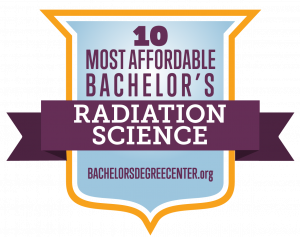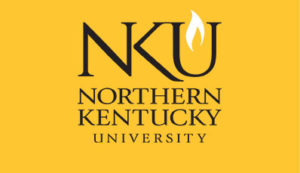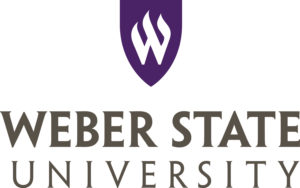
If you’re working as a radiologist or similar job with an associate’s degree, you should consider finding an affordable bachelor’s in radiation science.
Earning an associate’s degree in radiation science provides you with ample education to begin a career in the field of radiology, but you’ll find you hit the radiation therapy tech salary ceiling pretty quickly. In order to earn more money, your best option is to earn your bachelor’s degree in radiation therapy. A bachelor’s degree helps you gain access to better-paying jobs in the field, and position yourself to eventually earn your master’s in radiation technology.
However, a bachelor’s degree is a more expensive degree than an associate’s, but you can still save money on a four-year education. State universities are similar to community colleges in that they offer affordable tuition to in-state students. The schools that offer a bachelor’s degree in radiation science are also accredited by JRCERT or one of six regional accrediting agencies. You earn your bachelor’s degree with a much lower amount of debt than you would if you attended a private school and still have the same employment opportunities as state universities frequently have highly-regarded radiologic technology programs.
Methodology: Ranking the Most Affordable Radiation Science Degree Programs
For students who are paying their own way and need to keep costs (and student loan debt) down, Bachelor’s Degree Center has ranked the most affordable bachelor’s in radiation science programs. The following schools are featured in order of their tuition cost, using current IPEDS data. Only accredited, reputable institutions have been considered.
1. California State University, Northridge

California State University, Northridge has a BS in Radiologic Sciences that consists of two phases. The affordable radiation science degree consists of Pre-Professional and Professional phases. In the first phase, students finish their requirements for general education and prerequisites for the program. Then, students begin their radiologic science courses. The program includes an internship of 2,600 hours at and the area Medical Center.
CSU Northridge offers 60 majors and there are hundreds of organizations that students can join. This diverse and vibrant community focuses on both academic programs and student life. 82% of students receive some form of financial aid.
What We Like: Approximately 80% of students say that professors put a lot of effort into teaching their classes.
Degree: BS in Radiologic Sciences
2. Indiana University Northwest

Indiana University Northwest-Gary has a BS in Radiation Therapy that’s among the most affordable radiation science degrees. This program provides instruction in technical courses, principles and clinical application of radiologic therapy. It also includes general education courses in a variety of lab, lecture and clinical settings. Students learn the skills and techniques needed to become successful radiation therapists.
Located in the Chicago area, Indiana Northwest is in Gary, Indiana. This public school is open to all applications. The admissions team accepts three out of four candidates who apply. In all, there are over 2,500 students enrolled in majors that include nursing, business and radiologic technician.
What We Like: The school has a 75% acceptance rate and 85% of students receive financial aid.
Degree: BS Radiation Therapy
3. Northern Kentucky University

The BS in Radiation Therapy at Northern Kentucky University focuses on radiation oncology. Students who complete this affordable radiation science degree are prepared to take on roles as radiation therapists. The equipment uses radiation, such as radioactive substances or high energy X rays to kill cancer cells. This technology is also used to shrink tumors and relieve symptoms related to cancer. Radiation therapists deliver treatment to patients under the guidance of radiation oncologist.
Northern Kentucky admits nine out of 10 students who apply and there are currently more than 8,200 undergraduate students studying at the university. The school is located in the Cincinnati area giving students access to urban amenities. Other popular majors include liberal arts, nursing and business.
What We Like: Nearly all, 99%, of students receive some kind of financial aid, making the school highly accessible to those on a limited budget.
Degree: BS in Radiation Therapy
4. Midwestern State University — Texas

Midwestern State University offers a BS in Radiologic Technology. This affordable radiation science degree falls under the Shimadzu School of Radiologic. The program prepares learners for radiography careers. One second delete the course, graduates are prepared to sit for the American Registry of Radiologic Technologists (ARRT)’s national certification examination. The program has received accreditation from the Joint Review Committee on Education in Radiologic Technology (JRCERT). Students will learn to take a diverse approach to treating patience and developing on a personal and professional level.
MSU Texas is a small school in Wichita Falls, Texas. this small school has over 4,000 undergraduate students. It has a moderately competitive acceptance rate of 79%, meaning that nearly eight out of 10 applicants who apply receive an acceptance letter from the university. Besides radiologic technician, other popular programs include liberal arts humanities and nursing.
What We Like: Approximately 93% of students receive some kind of financial aid.
Degree: BS in Radiologic Technology
5. Northwestern State University of Louisiana

Northwestern State University of Louisiana’s affordable radiation science degree culminates in a BS in Radiologic Sciences. This program helps students develop the skills needed to begin work as radiologic technologists. Graduates emerge ready to begin jobs in this important health care profession. Using state of the art technology, students master imaging techniques and also learn how to treat patients with compassion. This rewarding career provides essential services. Graduates transition into jobs where they administer ionizing radiation and treat and diagnose injuries. Students learn to observe professional standards, administer care with compassion and exhibit ethical behavior in their dealings with family members and patients.
Northwestern State Louisiana has Approximately 6,300 students. This midsized school offers dozens of majors and is located in Natchitoches, Louisiana. About 82% of students who apply or accepted and choose from major such as psychology, nursing and liberal arts and humanities.
What We Like: Northwestern State Louisiana is the 5th ranking public university in the state.
Degree: BS in Radiologic Sciences
6. Baker College

Baker College in Owosso offers a BS in Radiation Therapy. This affordable radiation science degree teaches students how to administer radiation to treat cancer and related diseases. This important role is integral when it comes to the management of life-threatening cancer cases. It’s an allied health discipline and technicians interface with physicists and physicians to advance the field. It requires strong skills in medical science, psychology, and mathematics, among other diverse skillsets. Radiation therapists treat patients for months and become central to their healthcare and well-being.
Baker College has been educating students for more than 100 years and is continuously adopting new technology to produce well-prepared students for the workforce. The school only offers majors that correlate to high-growth careers. That way, students can rest assured that they are getting a high-quality education and marketable skill sets.
What We Like: Approximately 89% of students receive some form of financial aid.
Degree: BS in Radiation Therapy
7. Oakland University

Oakland University has an affordable radiation science degree resulting in a BS in radiologic technology. Located within the Department of Clinical and Diagnostic Sciences, the program offers students access to unique training in radiologic techniques, including treatment techniques requiring advanced understanding of Physiology, anatomy, and imaging technology. Graduates treat patients with ionizing radiation as well as conduct research.
Oakland University is located in the Detroit area. It’s a large institution with over 12,000 undergraduate students. it accepts most applicants who apply. Popular majors include health professions, nursing, and psychology.
What We Like: Oakland University is the number 10 top-rated public university in the state.
Degree: BS in Radiologic Technology
8. Weber State University

Weber State University offers a BS in Advanced Radiologic Sciences that’s one of the most affordable radiation science degrees. Students who choose Weber State I’ve taken the next step in their career to becoming certified radiologic technicians. Mastering the skills needed to perform this job involves more than one discipline. However, Weber State delivers the education needed to master this intensive degree. The degree program includes classes in radiation biology, patient education, patient care and assessment, pathophysiology, anatomy, image evaluation, and related topics.
This public university is located and the Salt Lake City area, specifically in Ogden, Utah. This large school has nearly 12,000 undergraduate students. Everyone who comes to the university gains acceptance and popular majors include nursing, liberal arts and humanities, and computer science.
What We Like: Weber State University is number six among Utah’s best value colleges.
Degree: BS in Advanced Radiologic Sciences
9. Austin Peay State University

Austin Peay State University has a BS in Radiologic Science degree that trains students to become radiologic technicians. This affordable radiation science degree focuses on the uses of ionizing radiation too help those diagnosed with cancer and related diseases. When they graduate, students will work under a specialist who diagnoses and ionizes radiation for the therapeutic treatment of cancer and other diseases. This career requires empathy, strength of character, and a deep knowledge of anatomy, radiology, and other disciplines. Using the latest techniques, radiologic technicians show compassion and competence in the workplace. They deal directly with patients and family members, so the job requires commitment to a wide treatment framework.
Austin Peay State is located in Clarksville, Tennessee. It has approximately 6,800 undergraduate students majoring in physical education, teaching, coaching, and liberal arts and humanities, among other majors available at the school. The school has a phenomenal acceptance rate of 95%.
What We Like: The 95% acceptance rate along with the affordability of tuition makes this a great choice for those who wish to become radiologic technicians.
Degree: BS in Radiologic Science
Visit the Program Site!
10. University of Michigan Flint

The University of Michigan Flint has a BS radiation therapy that is one of the most affordable radiation science degrees. Those who choose this field have to master a deep knowledge of high energy radiation that is used to treat illnesses, particularly different forms of cancer. Radiation therapy is usually part of a broader treatment strategy that often involves chemotherapy and surgery. These professionals administer radiation dosage that is determined by physicians who are specialists in the field. Often, radiologic technicians treat the same patient several times a week for weeks or months, giving them continuous access to patients. This provides an opportunity to develop relationships with patients which can be extremely rewarding.
UM-Flint students attend classes in the heart of the city. The close-knit community on campus help students grow both personally and professionally. The school offers some online study that may or may not be available for radiologic technology majors.
What We Like: The school has a competitive admissions process and just 66% of those who apply receive admission approval. However, 96% of students who do attend receive some kind of financial aid.
Degree: BS in Radiation Therapy
How Can I Save Money on a Radiation Science Degree?
When it comes to saving money on a radiation science degree, you have a few options available to you, but they depend on your educational goals. You can become a radiology technician and make an excellent radiation therapy tech salary after you earn an associate’s degree in radiation science. Another way to save money, especially if you’re interested in getting a bachelor’s degree in radiation science, is to attend a community college for an associate’s degree and transfer the credits to a four-year school. A professional certificate is another option, but only if you have a degree in a field related to radiologic technology.
One of the educational pathways to getting an affordable science degree is to enter into an associate’s degree program for radiation science. It takes about two years to earn the associate’s degree and the education can get you into entry-level positions as a radiation technologist. Many community colleges offer an associate’s degree program in radiation sciences and the per-credit cost of a community college education is much lower than at a university that has the same types of degree programs.
You may be resistant to going to a community college for your degree because there’s a common perception that going to community college means you’re not going to get a quality education. The fact is, community colleges around the country deliver an education that’s on par with four-year universities. They frequently hire educators who are professionals in the field of radiology, use recent technology for teaching tools, and have accreditation from organizations such as the Joint Review Committee on Education in Radiologic Technology (JRCERT). Accreditation ensures your degree is recognized and accepted by licensing bodies and employers.
Last, but not least, you can attend school online and save money on costs such as room and board, meal plans, and a commute. You also have more time for your studies so you can focus on earning the best grades possible. Employers won’t know that you attended school virtually unless you bring it up in an interview. Schools that offer online degrees don’t indicate how you attended classes on the diploma, and provide the same education to traditional and online students.
Will I Make More with a Bachelor’s Degree?
Yes, you will make more with a bachelor’s degree in radiation therapy technology than you would if you earned a professional certificate or associate’s degree. According to the BLS, the average radiation therapy technologist salary was $86,850 in 2020. Those who have a bachelor’s degree in radiation science are more likely to earn the median wage and higher, while those who have a certificate or associate’s degree earn less and their income may top out at the median. Other factors that influence the radiation therapy starting salary are your geographical location, the demand for radiation therapists, and your degree.
The average hourly pay for a radiation therapist is $34.65 with the 90th percentile earning $48.87 an hour and the lowest 10th percentile earning 27.56 an hour. The average radiation therapy technologist salary is well-compensated even at the lower end, but there is a lot of potential for higher income, and that typically comes with higher levels of education along with experience.
The field of radiation sciences is one with multiple sub-branches and offers students the opportunity to grow their knowledge and career as a general radiologist or in a more focused area in the science. Earning a bachelor’s degree in radiation therapy helps you earn more money and earn more than the average radiation therapy tech salary. You may also find that you want to eventually earn a doctorate in radiation technology because you enjoy this particular field of medical science. As your knowledge and experience in radiation technology grows, so does your radiation science salary.
Related Rankings:
25 Best Bachelor’s in Radiation Science
